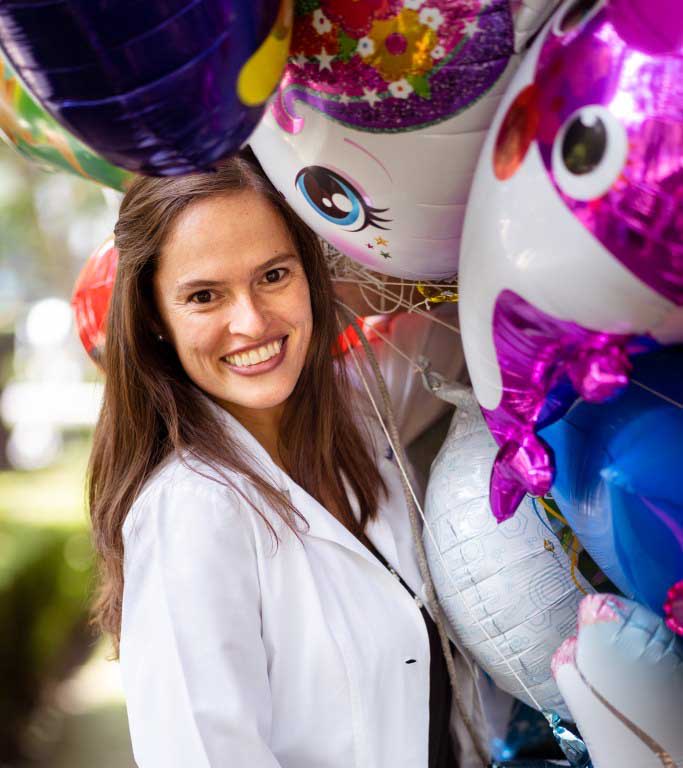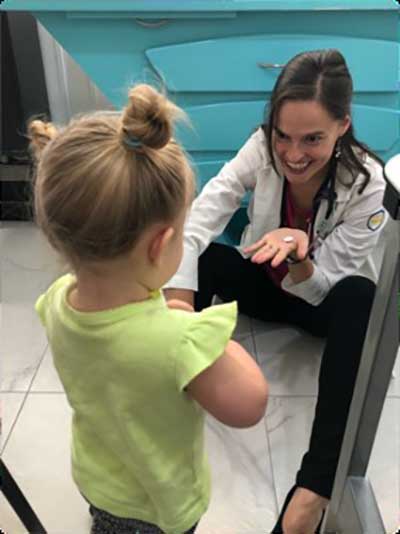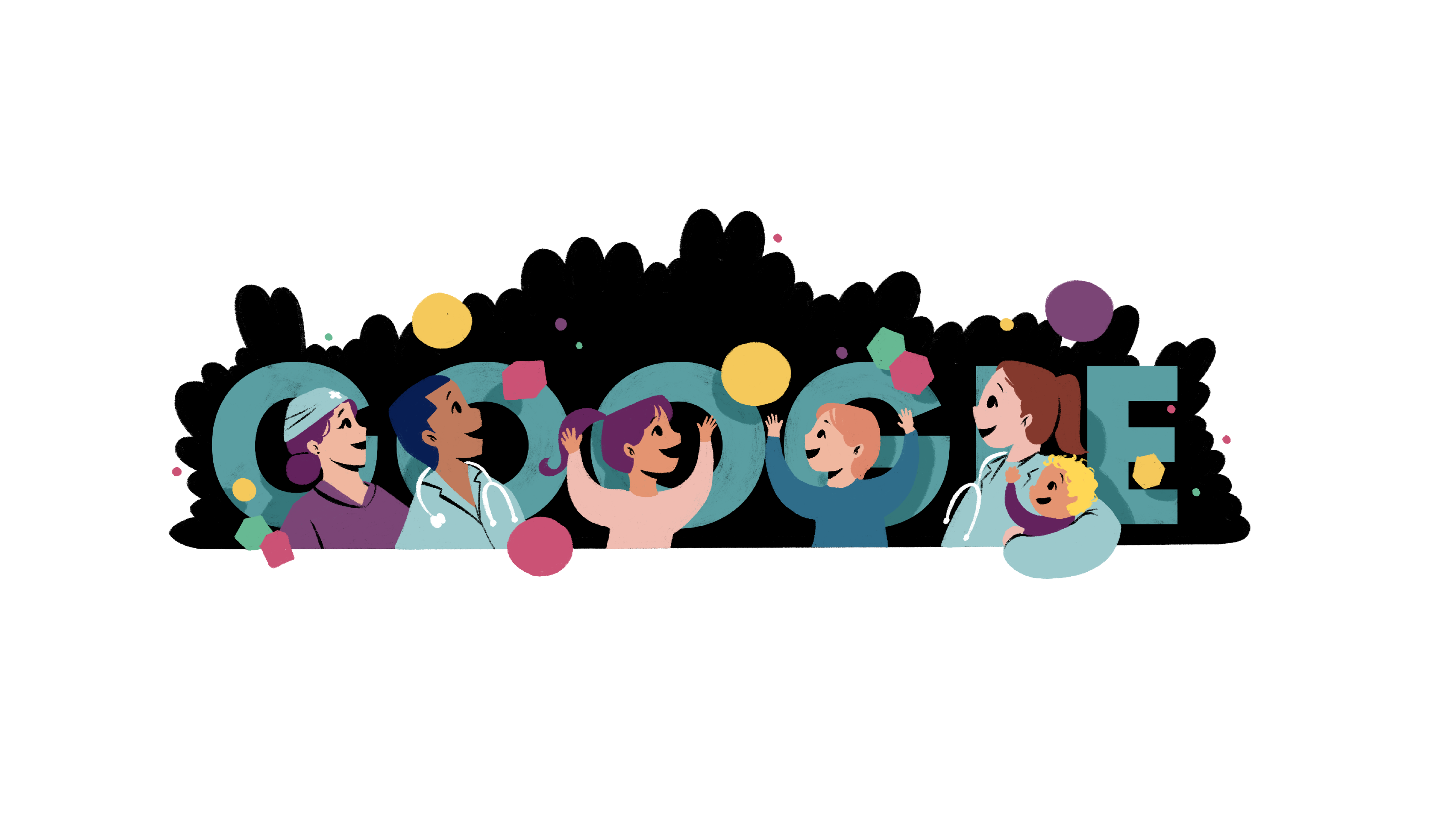

The Cambridge student aiming to start a ‘play and health revolution’

A Cambridge student has started a play and health initiative that she hopes will eventually grow into a ‘revolution’ in paediatric care and encourage more child-friendly, playful approaches in the field.
Paulina Perez-Duarte Mendiola, a qualified paediatrician and PhD student in the Faculty of Education’s PEDAL Centre, recently organised the first ever Play in Hospital Awareness week in her home country of Mexico. Her long-term ambition is to kick-start a series of such events internationally, build awareness of the power of play in healthcare settings, inspire fellow-professionals, and strengthen a developing network of specialists around the world.
The value of play in paediatric care is well-documented in research, and play is already recognised and systemically integrated into the healthcare systems of several countries. The United Kingdom, for example, has a network of about 650 specialists operating in hospitals, hospices and clinics. These practitioners use toys, games and playful interventions to put younger patients at their ease, which can be particularly important if children are seriously ill and need to spend long periods receiving treatment.
Play is also an important therapeutic tool, which can help children to understand their illness or treatment, prepare for potentially traumatic operations and procedures, and work through worries and concerns. Play and health specialists work not just with patients, but with their families – not least by helping parents and siblings to use play in similar ways.
Despite its proven benefits, in many other health systems globally, play in paediatric care is still rarely used – and in some cases almost unheard of. “It took me a long time to discover that play in hospitals was even a thing,” Paulina said. “Personally, I had always been a little bit playful in my own paediatric practice, but until I moved to the UK, I had no idea that there was a field and a theory dedicated to actually doing this.”
I’m interested in how the principles of play and health practice can shape the clinical professional’s mindset, even though most of them can’t exactly drop what they’re doing and start playing.
Although she was not aware of it at the time, the turning point that set Paulina on a course that would eventually lead her to study play and health occurred when she was still a trainee paediatrician in Mexico City. During her training, she met a 12-year-old boy whose injuries were so severe he needed a double amputation – but to her surprise, nobody had explained this to the patient. Paulina decided to do so herself. “By the time I found this out he was already under anaesthetic, and I remember standing next to him after surgery, waiting for him to wake up, and thinking: ‘I don’t know how to do this.’ It made me realise there was something missing from our training.”
The incident sparked to an interest in Medical Anthropology – the study of how one approaches healthcare from a social and cultural perspective. Paulina took a Masters Course in this at University College London, where she first encountered the concept of health and play specialists. She wrote her dissertation on how these practitioners explain chronic illnesses to children. Her PhD with PEDAL will take this line of enquiry one step further, by investigating children’s responses to play in healthcare to understand more about what works in the field and why.
In part, this reflects her wider ambition to introduce playful paediatric practice into wider clinical practice in countries where such specialisms rarely exist. “There is clearly a need to do more of this in other countries, but if you are working in a public hospital in Mexico, where you might be responsible for 120 kids, it’s difficult,” she said. “I’m interested in how the principles of play and health practice can shape the clinical professional’s mindset, even though most of them can’t exactly drop what they’re doing and start playing.”
It felt like there was a growing community, but my part of the world was missing.
Paulina’s academic work has turned her into an energetic advocate for play in health. After she started to promote ideas about this on social media, in particular via the Instagram account, Paediatrician With Sign, her work came to the attention of international groups promoting child-friendly healthcare practices such as Paediatric Potential and Il Porto Dei Piccoli, in Italy.
During her discussions through such groups, however, she became aware that Spanish-speakers and Latin Americans were largely absent from the conversation. “It felt like there was a growing community, but my part of the world was missing,” she said.
To address this, Paulina set about organising Mexico’s first ever Play in Hospital Awareness Week in December 2021. Over six days, this brought together far more than just Mexican specialists; involving 64 Spanish or Portuguese-speaking paediatricians, general practitioners, nurses, psychologists, other professionals and students from countries including Brazil, Venezuela, Ecuador, Spain and the US.

Its purpose was to enable participants to share ideas, inspire each other, and encourage a pro-play mindset in their practice and among colleagues in their professional settings. “Many of these advocates for play are quite isolated in their own communities of practice,” Paulina said. “Creating the network itself is important because it enables everyone to build links with like-minded professionals in countries where these ideas are not so common.”
The programme itself, thanks to the speakers who participated, covered different play techniques and approaches to child-friendly medical care; the relationship between play, patients and their wider families; discussions on how to use play to help children cope with chronic or even terminal illnesses; and the challenges of introducing these techniques into systems where they are still barely used.
I’m basically aiming for our own Google Doodle.
Two months on, it has clearly played a part in helping to spread the word about the power of play in health. A thriving community is beginning to share ideas, notes and experiences on social media. In one hospital in Mexico, some of the attendees even used evidence from the event to challenge colleagues who had initially prevented a child patient from taking their teddy bear with them into an operation. Encouragingly, the ban was overturned!
While Paulina is already starting to map out what she and her colleagues might cover at Mexico’s second Play in Hospital Awareness Week later this year, she also hopes that the concept will spread to other Spanish-speaking countries and beyond.
“In the long term, I’d like to see this challenge any health professional who works with children to think about how they can acquire a pro-play mindset,” she said. “I see it as an invitation to all practitioners to become playful healthcare professionals: to look around, think beyond their own biomedical mindset, and consider what they can do to make their work more child-friendly. The long-term aim is to get to the point where we’ve got international recognition for Play In Hospital Week, because that level of attention would be of huge benefit for so many children. I’m basically aiming for our own Google Doodle.”
To prove the point, she’s already had one designed in readiness.

Images in this story by:
Rubén Martínez @rubenonaplane https://www.instagram.com/rubenonaplane/
Daniela Pérez-Duarte Arredondo @danipd_ https://www.instagram.com/danipd_/